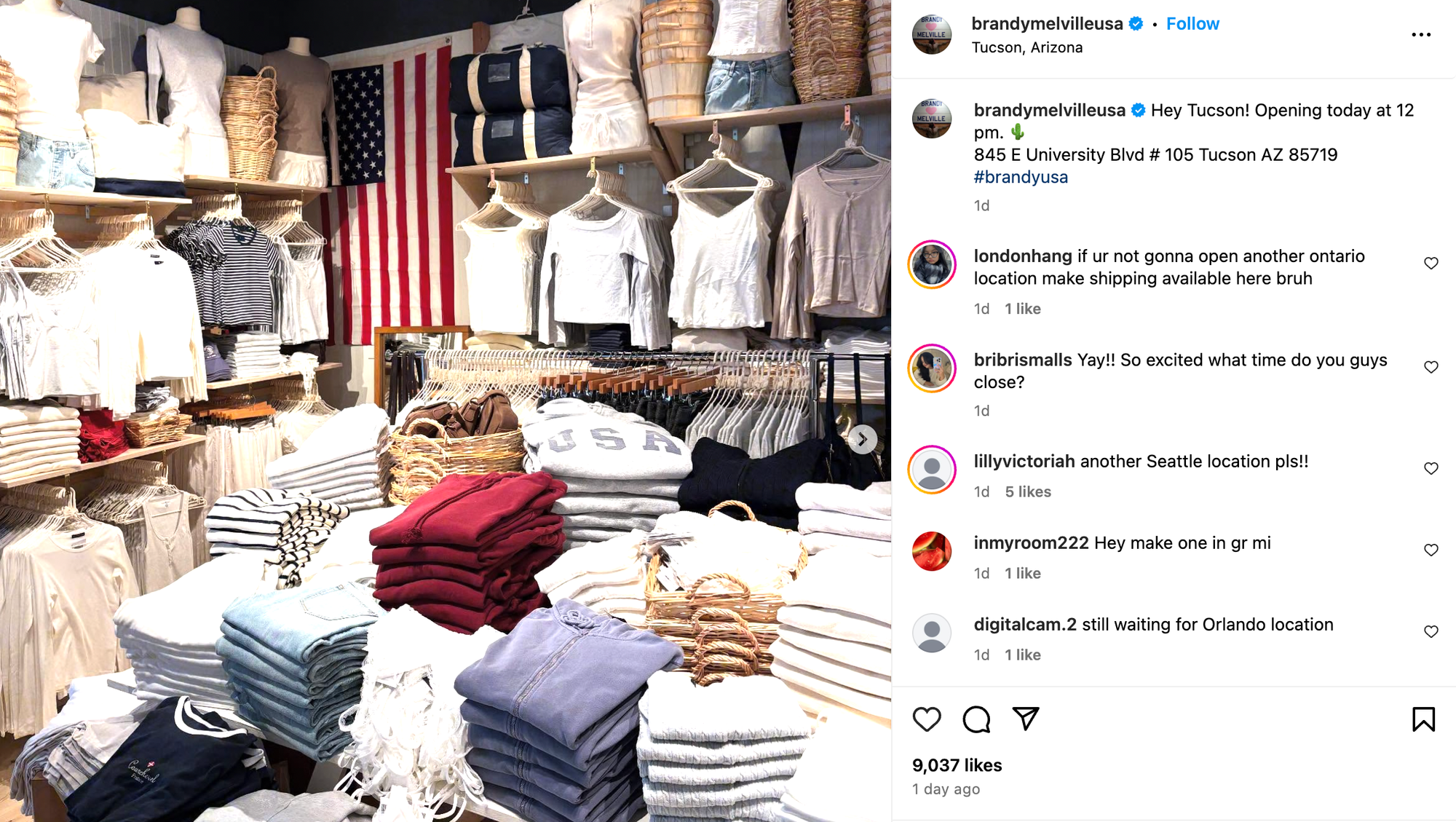Controversial fast fashion brand opens in Main Gate Square
Brandy Melville, a controversial fast-fashion brand known for its exclusive sizing and workplace criticisms, is opening a store in Main Gate Square, sparking debate among UA students and locals.

A controversial fast-fashion brand criticized for its exclusive sizing and workplace practices has opened a location in Main Gate Square, stirring debate among University of Arizona students and residents.
The Italy-based Brandy Melville opened its first U.S. store in 2009 in the Los Angeles Westwood neighborhood by the UCLA campus. It gained traction in 2014 when Bloomberg named the brand “Instagram’s First Retail Success.” At the time, half of all teens using social media reported having an Instagram account.
With celebrities including Lily-Rose Depp, Kendall Jenner and Hailey Bieber spotted wearing the brand, its West Coast-style clothing has only grown in popularity.
But it has drawn criticism for offering only extra-small and small sizes, which it describes as “one size fits all.”
The brand received increased scrutiny after HBO released a tell-all documentary last year titled, “Brandy Hellville and the Cult of Fast Fashion.”
The documentary explores former employees’ allegations of discriminatory business practices, such as pushing conventionally attractive white employees to the front of the store while placing employees of color in less visible roles, such as the back room.
In 2021, Business Insider’s Kate Taylor reported that senior executives had shared anti-Semitic and racist remarks in a group chat.
The following year, more than 4,000 employees filed a class-action lawsuit against the company, alleging they were not provided breaks and were required to work off the clock.
The Tucson location opened Saturday, with the company announcing its arrival to the UA on Instagram.

Many in the campus community were already familiar with the brand, in part because of their social media presence, but others, like UA Fashion Week Social Media Coordinator and Content Creator Alexia Waterman, have had more personal experiences with the brand.
“That was my first job,” Waterman said of her employment at another Brandy Melville location. “I really enjoyed it.”
She described the working conditions as easygoing, saying the staff was made up entirely of young women around her age. She said this helped her build a sense of community.
A day before the HBO documentary was released, Waterman, along with the majority of employees across all Brandy Melville locations, was suddenly laid off.
“Apparently, they do this thing where they ‘clean out’ their employees,” she said. “They said to everyone, ‘It's because we're not making enough money right now,’ but they just hired new people to replace the ones they laid off for no reason.”
The documentary included examples of employees struggling with eating disorders to maintain the brand’s image and customers pushing themselves to lose weight to fit into the clothes.
“I would have parents and stuff come up to me and say, ‘Why are you guys blocking girls that can't fit into this?’ It was really hard,” Waterman said. “I don't align with those (values).”
A survey by UA’s Department of Health Promotion found that since August 2023, 35% of students have been so focused on food, weight and body image that it negatively affected their quality of life, with 42% saying that comparing their meals or bodies to those on social media negatively affects their mental well-being.
Leah Small, social media coordinator for UA’s Catwalk magazine, said the brand’s messaging has skewed her perception of her body.
“It's been hard for me (to accept) that clothes I wore in middle school and high school don't fit anymore, which is completely normal,” she said. “I think it's really hard for girls to see other girls going and getting (Brandy Melville’s) clothes. Their sizes are not real.”
The documentary also touches on the impact of the brand’s lack of transparency regarding environmental and social considerations, discussing how the life cycle of fast fashion garments often includes worker exploitation and rapid disposal by consumers.
“I'd prefer to buy Brandy Melville secondhand than to buy it directly,” said Anna Hurtado, assistant editor at Catwalk magazine. “I’ve sworn off buying from fast fashion.”
Hurtado said that after looking into the industry’s business practices and environmental impact, she could no longer justify making those types of purchases.
“I do try to research brands about their sustainability practices before I go ahead and buy them,” she said. “And that's not always perfect because brands do have a tendency to greenwash.”
Greenwashing is a form of deceptive marketing that makes an organization’s products, goals or policies appear environmentally friendly when they are not.
Catwalk’s Small said that while Brandy Melville setting up shop near UA makes sense, it doesn’t fit Tucson’s fashion scene.
“Tucson as a whole is so eclectic and unique, and I love all the boutiques that are on Fourth Avenue,” she said. “But when you come to University Boulevard, it's ‘girly-girl’ central.”
Topacio “Topaz” Servellon is a freelance journalist out of Tucson. Contact them at topacioserve@gmail.com.
Tucson Spotlight is a community-based newsroom that provides paid opportunities for students and rising journalists in Southern Arizona. Please support our work with a paid subscription.




